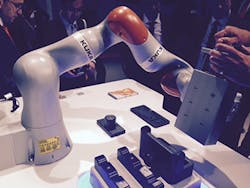Industry 4.0 Offers Wonders and Plenty of Wondering
Industry 4.0 (or call it smart manufacturing, the Internet of Things, or a variety of other terms) is the most discussed topic at this year’s Hannover Messe industry fair in Germany. And the question many are asking at this huge exhibition of the latest manufacturing technology is the title of our recent article by Travis Hessman, “Are You Ready for the Next Industrial Revolution?”
That question has a purely technical aspect, of course. Are the machines, IT systems and standards in place to make the factory of the future a reality now? The evidence from Hannover Messe is that there is considerable progress being made. ABB’s YuMi two-armed robot and KUKA’s LBR iiwa robot, for example, were two examples of the new wave of “collaborative robots” designed to work alongside people rather than be separated by safety cages. Imprimere showed its Big 3D printer than can produce concrete objects measuring 21 feet in diameter and 18 feet in height. These and a host of other emerging technologies point to factories that are fast, flexible, safe and more connected to customers than ever before.
Industry 4.0, despite its emphasis on technology, also is very much a people issue. This new technology requires a whole ecosystem of engineers, technicians and other well-trained personnel to develop, manufacture, install and maintain these systems. You would be hard-pressed to find any nation that thinks it has this challenge well in hand. Will existing education and training systems evolve to meet this demand, or will it call for revolutionary changes in education? Could the United States end up with an education system similar to Germany, where some children will follow vocational tracksIndustry 4.0 is being led by the United States and Germany, but countries that want to build their manufacturing industries, such as India, will no doubt be taking a much closer look at the capabilities of these machines. India is taking a building blocks approach to its industrialization, focusing on infrastructure and the development of specific industry sectors. But some observers wonder if smart manufacturing offers India and other emerging nations a chance to leapfrog the West by investing in the latest generation of production capacity. It’s an interesting question to ponder, particularly when the subject is a nation of 1.3 billion people that could see its manufacturing sector, according to a McKinsey analysis, possibly grow sixfold to $1 trillion in 10 years.
For manufacturers in the West, a more immediate question is what to do with all the data that is being generated by smart machines. Some companies are using the data to achieve more efficient operations, such as by figuring out when parts in machines are wearing out and implementing more effective maintenance actions. But big data also offers the chance for manufacturers to create whole new service businesses that utilize the data their products are generating. Figuring out what the possibilities are and whether customers will pay for these services will be a major challenge for manufacturing leadership. But rest assured, in a data-enabled future, it’s increasingly likely that companies won’t be just manufacturers but service providers as well.
About the Author
Steve Minter
Steve Minter, Executive Editor
Focus: Leadership, Global Economy, Energy
Call: 216-931-9281
Follow on Twitter: @SgMinterIW
An award-winning editor, Executive Editor Steve Minter covers leadership, global economic and trade issues and energy, tackling subject matter ranging from CEO profiles and leadership theories to economic trends and energy policy. As well, he supervises content development for editorial products including the magazine, IndustryWeek.com, research and information products, and conferences.
Before joining the IW staff, Steve was publisher and editorial director of Penton Media’s EHS Today, where he was instrumental in the development of the Champions of Safety and America’s Safest Companies recognition programs.
Steve received his B.A. in English from Oberlin College. He is married and has two adult children.

